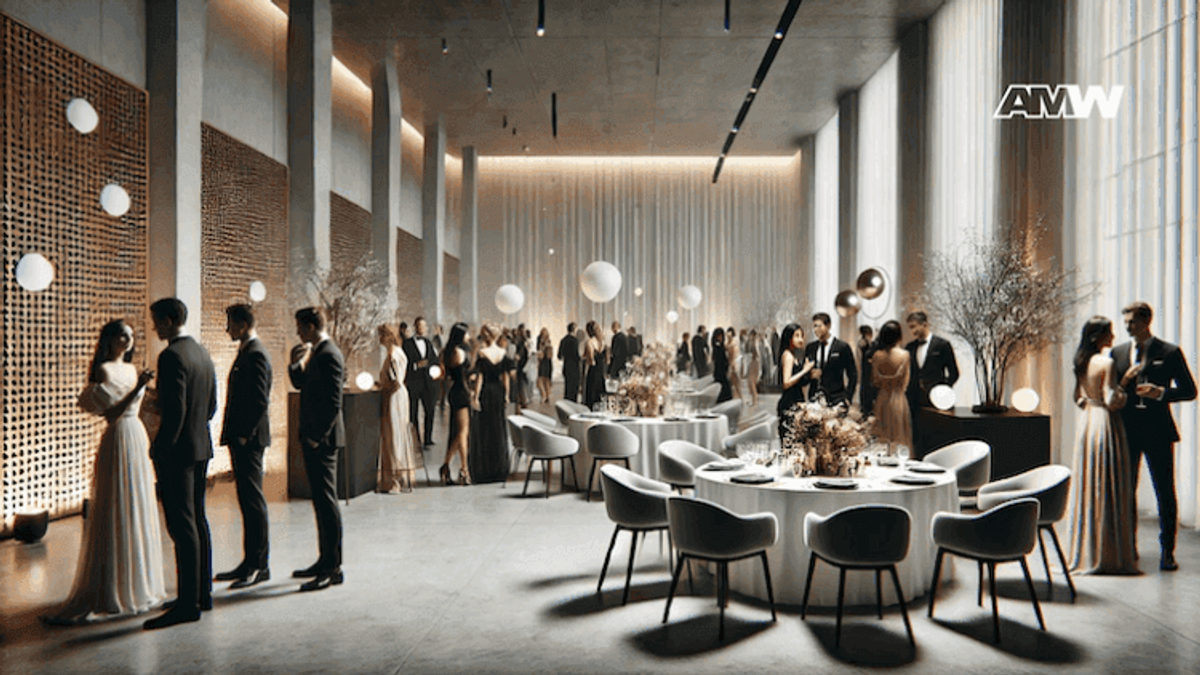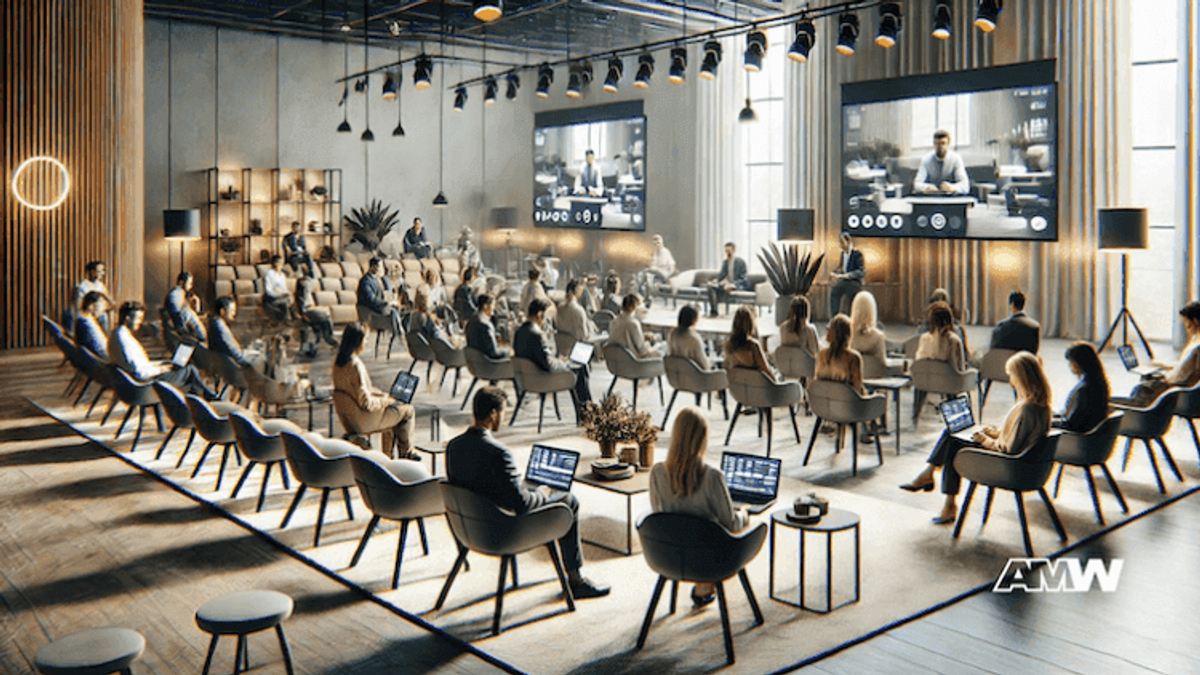10 Creative Marketing Event Ideas That Will Wow Your Audience

Creating memorable and engaging marketing events is important for capturing your audience's attention and fostering brand loyalty.
Quick Summary
Creating memorable and engaging marketing events is key for capturing audience attention and enhancing brand loyalty. Implementing innovative ideas like Virtual Reality experiences, pop-up shops, interactive workshops, and themed parties can significantly boost engagement. Collaborations with influencers and celebrities amplify reach, while hybrid events combine physical and virtual elements for broader participation. Ultimately, these creative strategies ensure your events stand out and yield i
Innovative marketing event ideas not only help differentiate your brand but also drive significant engagement and business results.
This blog will explore ten creative ways to promote events that will captivate your audience and enhance your brand's visibility.
Ready to Grow Your Business?
Get a custom strategy tailored to your goals.
1. Virtual Reality (VR) Experiences

Virtual Reality (VR) experiences are at the forefront of modern marketing ideas for events. VR technology allows you to create immersive environments that can transport attendees into different worlds, providing an unparalleled interactive experience.
Marketing Event Ideas

Use VR to offer virtual tours of your facilities, immersive product demonstrations, or even create a virtual environment that represents your brand's ethos. For example, a travel company could use VR to showcase exotic destinations, allowing potential customers to experience the sights and sounds of a location before booking a trip.
Event Promotion Examples
Promote your VR experiences through social media teasers, email campaigns, and collaborations with influencers who can give a sneak peek of what attendees can expect. Highlight the uniqueness and interactivity of the VR experience to attract tech-savvy and curious attendees.
2. Pop-Up Shops and Flash Mobs

Pop-up shops and flash mobs are dynamic promotional ideas for events that create a sense of urgency and exclusivity. These temporary, surprise elements can generate significant buzz and draw in large crowds.
Creative Ways to Promote an Event
A pop-up shop can provide a tangible interaction with your products in a unique setting. Ensure the shop's design and location align with your brand identity and target audience. Flash mobs, on the other hand, can surprise and delight by transforming ordinary spaces into extraordinary experiences, creating viral moments.
Event Campaign Ideas
Use social media and local advertising to create intrigue without revealing too much detail. For flash mobs, choose high-traffic areas and times to maximize visibility and impact. Record the event on video and share it on your digital platforms to reach more people beyond the physical event.
3. Interactive Workshops and Classes

Interactive workshops and classes offer valuable, hands-on experiences that can deeply engage your audience. These events not only offer educational value but also improve the relationship between the brand and its customers.
Conference Marketing Ideas
At conferences, integrated workshops that offer practical skills and knowledge relevant to your industry. This approach not only enhances the conference experience but also positions your brand as a thought leader and valuable resource.
Creative Event Marketing
Promote your workshops through detailed agendas, showcasing the expertise of the instructors and the tangible benefits participants will gain. Utilize email marketing, social media, and partnerships with industry influencers to spread the word.
4. Themed Parties and Galas

Themed parties and galas are fun marketing events that can make a strong impression on attendees. A well-executed theme can create an immersive environment that fits with your brand and holds your audience's attention.
Party Promotion Ideas
Choose a theme that shows your brand's personality and connects with your intended audience. From futuristic sci-fi themes to elegant black-tie galas, the options are limitless. The key is to ensure every aspect of the event, from decorations to entertainment, supports the chosen theme.
Creative Ways to Promote Events
Use visually compelling invitations and promotional materials that reflect the theme. Use social media to create excitement and encourage attendees to share their anticipation using a branded hashtag. This not only promotes the event but also generates user-generated content.
5. Live Demonstrations and Product Launches

Live demonstrations and product launches are effective event advertising ideas that allow your audience to see your products in action. These events can create excitement and buzz around new offerings, driving interest and sales.
PR Ideas for Events
Plan an exciting product launch event with live demonstrations so attendees can try out the product themselves. Invite industry influencers, media representatives, and key customers to maximize coverage and impact.
Event Promotion Examples
Utilize live streaming to reach a broader audience who cannot attend in person. Promote the live stream through your website, social media channels, and email newsletters. Post-event, share highlights and key moments to keep the buzz going and reach those who missed the live event.
Ready to Grow Your Business?
Get a custom strategy tailored to your goals.
By implementing these creative marketing event ideas, you can create engaging and memorable experiences that not only attract but also retain your audience. These will help you stand out and achieve your event goals effectively.
6. Influencer and Celebrity Collaborations

Collaborating with influencers and celebrities can significantly amplify your event's reach and credibility. Their endorsement can attract a bigger audience and improve the perceived value of your event.
Marketing Ideas for Conferences
For conferences, consider having well-known industry experts or celebrities as keynote speakers. Their presence can draw attendees and lend authority to your event. Additionally, influencers can share their experiences in real time, expanding your event's visibility.
Creative Event Marketing
Work with influencers to create engaging content leading up to the event. This could include behind-the-scenes looks, interviews, or exclusive previews. Their promotion across their platforms can drive significant interest and attendance.
7. Experiential Marketing Installations

Experiential marketing installations are creative ways to promote events that engage attendees through interactive and sensory experiences. These installations can be particularly impactful in creating memorable moments that resonate with your audience long after the event.
Event Campaign Ideas
Develop installations that allow participants to engage with your brand in unique ways. This could be an interactive art display, a sensory booth, or a gamified experience. Ensure that the installation reflects your brand's values and message.
Creative Ways to Promote Events
Use teaser videos and behind-the-scenes content to build anticipation. Encourage event attendees to share on social media, cultivating organic buzz and expanding your event's reach.
8. Community Engagement and Charity Events

Hosting events that give back to the community or support charitable causes can enhance your brand's image and create a deeper connection with your audience. These events not only promote goodwill but also attract participants who are passionate about making a difference.
Promotional Ideas for Events
Partner with local charities to create events that align with your brand values. This could include charity runs, donation drives, or community clean-up events.
Event Promotion Examples
Highlight the charitable aspect of your event in all promotional materials. Use social media to share stories about the cause and the impact of the event. Engage local media to cover the event and amplify its reach.
9. Interactive Social Media Campaigns

Leveraging social media to create interactive campaigns is an effective way to engage your audience before, during, and after the event. These campaigns can drive participation and generate buzz, making your event more dynamic and far-reaching.
Event Advertising Ideas
Create social media challenges, contests, or live Q&A sessions related to your event. Use platforms like Instagram, Twitter, and Facebook to engage with your audience in real time.
Creative Ways to Promote an Event
Use interactive elements like polls, quizzes, and user-generated content to keep your audience engaged. Promote these activities through targeted ads and partnerships with social media influencers.
Ready to Grow Your Business?
Get a custom strategy tailored to your goals.
10. Hybrid Events: Combining Physical and Virtual Elements

Hybrid events, which combine in-person and virtual elements, are becoming increasingly popular. They offer the flexibility to reach a broader audience while providing the interactive experiences of physical events.
Marketing Ideas for Conferences
For conferences, offer both in-person and virtual attendance options. Use live streaming, virtual networking sessions, and interactive online content to engage remote attendees.
Creative Event Marketing
Promote the hybrid nature of your event through all channels, highlighting the benefits of both participation methods. Use technology to create a seamless integration between the physical/virtual components, ensuring a cohesive experience for all attendees.
Conclusion

By implementing these creative marketing event ideas, you can create engaging and memorable experiences that not only attract but also retain your audience. These will help you stand out in a crowded market and achieve your event goals effectively. Whether you are planning a product launch, a themed party, or a large conference, these innovative approaches will ensure your event is a success.
FAQ

How can I measure a marketing event?
Use key performance indicators (KPIs) such as attendance numbers, audience engagement, social media mentions, lead generation, and post-event surveys to evaluate your event. Metrics like net promoter scores (NPS) and sales conversions can also provide insights into the event's impact.
What budget should I allocate for a marketing event?
The budget can vary depending on the type and scale of the event. Consider costs for venue, technology, marketing materials, guest speakers, entertainment, catering, and promotions. Start with a detailed budget plan and adjust as needed. It's also wise to allocate a contingency fund for unexpected expenses.
How far in advance should I start planning a marketing event?
Ideally, start planning at least 6-12 months in advance for larger events. This allows ample time for securing venues, coordinating with partners, and promoting the event. Smaller events might require a shorter timeline, but early planning is always beneficial to ensure all details are covered.
How do I choose the right theme for my event?
Consider your target audience, brand identity, and the message you want to convey. A well-chosen theme should resonate with your audience and enhance the overall experience. Conducting surveys can provide insights into what themes might appeal most to your attendees.
What are some effective ways to promote my marketing event?
Use channels like social media, email marketing, partnerships with influencers, press releases, and your company's website. Early and consistent promotion is key to attracting attendees. Use targeted ads and personalized invitations to reach specific segments of your audience.
How can I ensure high attendance at my event?
Offer valuable content, provide networking opportunities, use engaging promotional tactics, and consider incentives such as early bird discounts or exclusive access to new products. Personal invitations and follow-up reminders can also boost attendance rates.
What should I do if something goes wrong during the event?
Have a contingency plan in place for potential issues. Communicate transparently with your audience, address problems promptly, and focus on providing solutions. Ensure your event staff is trained to handle unexpected situations effectively.
Can I host a successful marketing event online?
Yes, virtual events can be highly effective. Ensure you use reliable technology, create engaging content, and interact with your audience through Q&A sessions, polls, and interactive activities. Promote the virtual event just as you would an in-person one to ensure high participation.
How do I keep my audience engaged throughout the event?
Incorporate interactive elements, maintain a dynamic and varied program, use engaging visuals, and encourage participation through questions, polls, and live feedback. Break up sessions with networking opportunities and entertainment to keep the energy high.
What post-event activities should I consider?
Follow up with attendees via thank-you emails, gather feedback through surveys, share event highlights on social media, and analyze event data to plan future improvements. Providing access to recorded sessions or additional resources can also extend the value of the event.

Ready to Grow Your Business?
Get a custom strategy tailored to your goals.
Frequently Asked Questions
What are the most effective creative marketing event ideas for small businesses?
Small businesses can maximize impact with pop-up shops, interactive workshops, and community charity events. These options are cost-effective while creating memorable experiences. Pop-up shops generate urgency and exclusivity, workshops position your brand as an expert, and charity events build community goodwill. Focus on events that align with your brand values and target audience interests to ensure maximum engagement and return on investment.
How do you promote a marketing event on social media effectively?
Effective social media event promotion involves creating teaser content, behind-the-scenes videos, and interactive campaigns. Use branded hashtags, collaborate with influencers for wider reach, and leverage live streaming during the event. Create polls, contests, and user-generated content to engage audiences. Post consistently across platforms like Instagram, Facebook, and Twitter, and encourage attendees to share their experiences to generate organic buzz and expand your event's visibility.
What makes virtual reality experiences successful for marketing events?
Successful VR marketing events create immersive, brand-aligned experiences that transport attendees to different worlds. Key elements include offering virtual facility tours, interactive product demonstrations, or environments representing your brand ethos. Promote through social media teasers and influencer collaborations highlighting the unique, interactive nature. VR works best when it provides value beyond novelty, such as allowing travel companies to showcase destinations or letting customers experience products before purchasing.
How can I measure the success of creative marketing events?
Measure event success through attendance numbers, social media engagement metrics, lead generation, and post-event surveys. Track branded hashtag usage, user-generated content, and media coverage. Monitor sales conversions, email sign-ups, and follow-up engagement rates. For experiential events, assess brand awareness lift and sentiment analysis. Set specific KPIs before the event, such as number of demos conducted, social shares generated, or partnerships formed to evaluate ROI effectively.
What are the best ways to create buzz before a product launch event?
Build pre-launch buzz through live demonstrations, influencer collaborations, and exclusive previews. Create teaser campaigns showing behind-the-scenes content and product development stories. Partner with industry experts and media representatives for credibility. Utilize countdown campaigns on social media, offer early-bird access to VIPs, and share sneak peeks through email marketing. Plan live streaming options for broader reach and create anticipation with interactive social media polls and contests.
How do themed parties and galas enhance brand engagement?
Themed events create immersive environments that align with brand personality and captivate audiences. Success requires ensuring every element—decorations, entertainment, invitations—supports the chosen theme. Use visually compelling promotional materials reflecting the theme and encourage social sharing with branded hashtags. Themes should resonate with your target audience, whether futuristic sci-fi or elegant black-tie. This approach generates user-generated content and creates memorable experiences that strengthen brand-customer relationships long-term.
What are effective low-cost marketing event ideas that still create impact?
High-impact, budget-friendly events include interactive workshops, community charity initiatives, and flash mobs in high-traffic areas. Leverage social media campaigns with user-generated content, host educational seminars positioning your brand as a thought leader, or create experiential installations using creative materials. Partner with local businesses for cross-promotion, utilize free venues like parks or community centers, and focus on events that generate organic social sharing to amplify reach without significant advertising spend.
Related Resources
Calculators
Pricing Guides
Key Terms
Marketing strategy that promotes brands, products, or services through hosted or sponsored in-person or virtual events.
Attendee AcquisitionThe marketing strategies and tactics used to attract and convert target audiences into event registrants.
Event Experience DesignHolistic approach to creating memorable, purposeful attendee journeys at events.
Attendee Acquisition StrategyPlanned approach to attracting and registering target audiences for events.
Post-Event StrategyPlanned follow-up activities that extend event value and drive business outcomes.
Related Articles

Experiential Marketing: Creating Immersive Brand Experiences
Experiential marketing is rapidly becoming a cornerstone of modern marketing strategies. This approach focuses on creating memorable, immersive experiences that engage customers on a level deeper

Creating Memorable Brand Activation Events: A Guide to Engaging Your Audience
Once upon a time, in a bustling city center filled with potential customers, a local startup decided to launch a product in a way that would stick in the minds of its audience forever. Instead of o

Event for Marketing: Crafting an Effective Strategy
Planning an event for marketing purposes can be a good tool to connect with your audience, create memorable experiences, and promote your brand. Whether organizing in-person events, virtual events